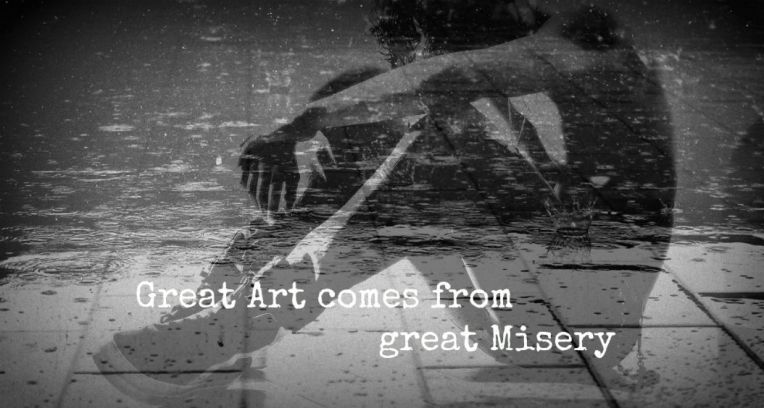Does great inspiration only come from great misery?
Some of our best pieces of art, literature and music for sure imply a connection.
Van Gogh, Beethoven, Kafka, Nietzsche – and many more great creators – suffered a miserably life full of depression, loneliness and pain. Is it that suffering what made their masterpieces possible in the first place?
At least that is what the people behind the events in Joey Goebel’s novel “Torture the Artist” believe. In a world, where true art has been replaced with cheap entertainment, a dying media mogul decides to resurrect his country’s culture in a program to bring fine arts back into public.
The core of the project is the “tortured artist”. An artist that is never to be happy, content or at peace, but instead will be kept in a state of constant misery and pain. This shall fuel his creativity and make him bring forth one masterpiece after the other. These pieces – mainly music, movies and TV shows – will than be funnelled into the public and will slowly increase the quality of mass entertainment.
The one chosen as fated artist is Vincent, only a small, sickly and lonely child when we first meet him. Full of trust and dreams he enters his new life at the “New Renaissance” school for arts. And always close to him, we find his chaperon, Harlan Eiffler. Officially he is there to be Vincent’s mentor and manager. But unbeknownst to Vincent, Harlan is the person paid to make sure, Vincent is kept in the state of creative misery.
Believing to act for the greater good of humankind, Harlan steps into his role as secret torturer: Poisoning Vincent’s dog, so he learns about death and mortality. Paying or frightening off the few girls that show an interest in Vincent, to make him experience loneliness and unfulfilled desire. Breaking every friendship Vincent forms, to teach him about betrayal and the selfishness of people.
And the plan succeeds. In his misery Vincent’s work thrives. He soon writes countless famous rock songs, numerous brilliant TV shows and a handful of critically acclaimed movies.
But with growing closeness between artist and mentor, the toll not only on Vincent but also on Harlan begins to show. Is he really doing the right thing? Can he continue to hurt the kid he has come see as friend? But if he drops out, who will protect Vincent from the increasingly uglier schemes of his employers. Or are they both already to deep in to ever get out alive? And if Vincent learns that the only person he trusts has been deceiving him his whole life, will that not break him completely?
“Torture the Artist” asks an interesting question: Is a true friend and mentor a person that makes you feel you happy and content? Or is it – in the long-term – the person that helped you grow and live up to your potential, even if it meant you suffered and grew to hate that person?
Food for thought are also the reoccurring, witty statements about the current state of TV, cinema and music.
Have we seen any improvement in these fields, in the past 10 years since “Torture the Artist” was first published?

